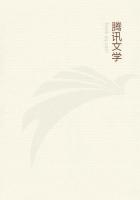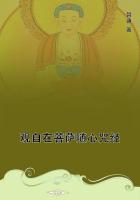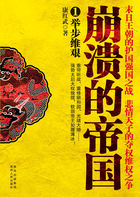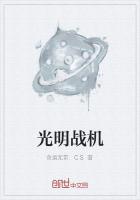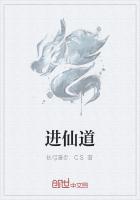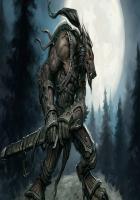Then Kai Kaous seated himself once more upon his throne, and men were glad that there was peace. And the Shah opened the doors of justice and splendour, and all men did that which was right, and the wolf turned him away from the lamb, and there was gladness through all the length of Iran. And the Shah gave thanks unto Rustem that he had aided him yet again, and he named him Jahani Pehliva, which being interpreted meaneth the champion of the world, and he called him the source of his happiness. Then he busied himself with building mighty towers and palaces, and the land of Iran was made fair at his hands, and all was well once more within its midst.
But Ahriman the wakeful was not pleased thereat, and he pondered how he could once again arouse the ambition of the Shah. So he held counsel with his Deevs how they might turn the heart of Kai Kaous from the right path. And one among them said-"Suffer that I go before the Shah, and I will do thy behest."
And Ahriman suffered it. Then the Deev took upon him the form of a youth, and in his hand he held a cluster of roses, and he presented them unto the Shah, and he kissed the ground before his feet. And when Kai Kaous had given him leave to speak he opened his mouth and said-"O Shah, live for ever! though such is thy might and majesty that the vault of heaven alone should be thy throne. All the world is submissive before thee, and I can bethink me but of one thing that is lacking unto thy glory."
Then Kai Kaous questioned him of this one thing, and the Deev said-"It is that thou knowest not the nature of the sun and moon, nor wherefore the planets roll, neither the secret causes that set them in motion.
Thou art master of all the earth, therefore shouldst thou not make the heavens also obedient to thy will?"
When Kai Kaous heard these words of guile his mind was dimmed, and he forgot that man cannot mount unto the skies, and he pondered without ceasing how he could fly unto the stars and inquire into their secrets.
And he consulted many wise men in his trouble, but none could aid him. But at last it came about that a certain man taught him how he could perchance accomplish his designs. And Kai Kaous did according to his instructions. He built him a framework of aloe-wood, and at the four corners thereof he placed javelins upright, and on their points he put the flesh of goats. Then he chose out four eagles strong of wing, and bound them unto the corners of this chariot. And when it was done, Kai Kaous seated himself in the midst thereof with much pomp. And the eagles, when they smelt the flesh, desired after it, and they flapped their wings and raised themselves, and raised the framework with them. And they struggled sore, but they could not attain unto the meat; but ever as they struggled they bore aloft with them Kai Kaous and the throne whereon he sat. And so long as their hunger lasted, they strove after the prey. But at length their strength would hold no longer, and they desisted from the attempt. And behold! as they desisted the fabric fell back to earth, and the shock thereof was great. And but for Ormuzd Kai Kaous would have perished in the presumption of his spirit.
Now the eagles had borne the Shah even unto the desert of Cathay, and there was no man to succour him, and he suffered from the pangs of hunger, and there was nothing to assuage his longing, neither could his thirst be stilled. And he was alone, and sorrowful and shamed in his soul that he had yet again brought derision upon Iran. And he prayed to God in his trouble, and entreated pardon for his sins.
While Kai Kaous thus strove with repentance, Rustem learned tidings of him, and he set out with an army to seek him. And when he had found him he gave rein unto his anger, and he rebuked him for his follies, and he said-"Hath the world seen the like of this man? Hath a more foolish head sat upon the throne of Iran? Ye would say there were no brains within this skull, or that not one of its thoughts was good. Kai Kaous is like a thing that is possessed, and every wind beareth him away. Thrice hast thou now fallen into mishap, and who can tell whether thy spirit hath yet learned wisdom? And it will be a reproach unto Iran all her days that a king puffed up with idle pride was seated upon her throne, a man who deemed in his folly that he could mount unto the skies, and visit the sun and moon, and count the stars one by one. I entreat of thee to bethink thee of thy forefathers, and follow in their steps, and rule the land in equity, neither rush after these mad adventures."
When Kai Kaous had listened to the bitter words spoken by Rustem, he was bowed down in his spirit and ashamed before him in his soul.
And when at last he opened his mouth it was to utter words of humility.
And he said unto Rustem-"Surely that which thou speakest, it is true."
Then he suffered himself to be led back unto his palace, and many days and nights did he lie in the dust before God, and it was long before he held him worthy to mount again upon his throne. But when he deemed that God had forgiven him, he seated him upon it once again.
In humility did he mount it, and he filled it in wisdom. And henceforth he ruled the land with justice, and he did that which was right in the sight of God, and bathed his face with the waters of sincerity.
And kings and rulers did homage before him, and forgot the follies that he had done, and Kai Kaous grew worthy of the throne of light.
And Iran was exalted at his hands, and power and prosperity increased within its borders.

